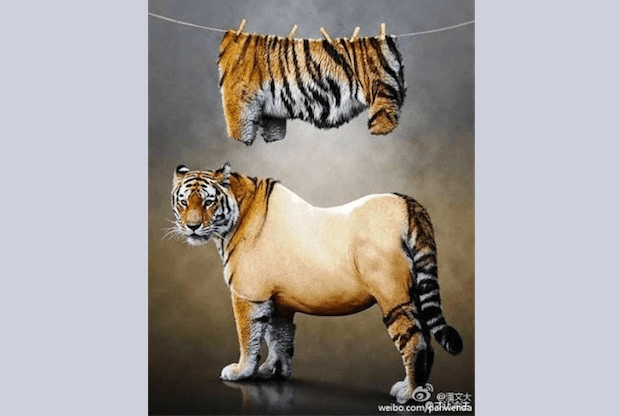Jiang Zemin, a former leader of the Chinese Communist Party, turned 88 on Sunday. Online, he received what was probably an unwelcome birthday card.
A mock card that has gone viral shows a tiger looking at the camera, his fur shorn, hanging on a line above his head.
“Jiang Zemin’s birthday is on Aug. 17, and a picture of a tiger with its fur removed has gone viral online,” said the user who reposted the image, which was deleted from Sina Weibo, China’s version of Twitter, but was featured as the top search item on freeweibo.com, a website which collates deleted Weibo posts. The words “Jiang Zemin” are listed as the most popular topic on Free Weibo.
Some users of Twitter, both Chinese and non-Chinese, wrote: “It’s Jiang’s birthday—who’s he going to spend it with?” It was an apparent jab on Jiang’s isolation, now that many of his political allies have been taken out of the picture.
It appeared, too, that all posts that referred to Jiang were purged from Weibo, including innocuous ones that added genuine well wishes.
Jiang, who ruled China from just after the Tiananmen Square Massacre in 1989 until, officially, 2002, is now thought to be the next possible target of Party leader Xi Jinping’s political purge.
Party propaganda calls it an anti-corruption campaign, and while many officials with no particular political import have been taken down, the most prominent targets have been high-ranking Party cadres associated with Jiang Zemin. These include, most recently, Xu Caihou, a former second-in-command of China’s military, and Zhou Yongkang, the last security chief, whom Jiang appointed and protected.
More than these men, Jiang Zemin has stood at the center of the political network that is being targeted by Xi’s campaign, and the thinking is that Jiang may only be able to avoid being bagged himself for so long.
Hence the picture of a tiger with no fur (“tigers,” in China’s political lexicon, are powerful Party members who have committed misdeeds and face corruption charges.)
Whether Xi Jinping would actually arrest and punish Jiang as he has other officials is unclear. But elite political struggle in China has often been a high-stakes, life and death affair. Savvy Chinese Internet users, at least, seem open to the possibility of a takedown of Jiang, based on recent chatter.
Pictures of workers allegedly removing monuments to Jiang from official building—typically inscriptions or quotations by Jiang on the side of buildings—around the country went viral on the Internet last week.
Also recently, overseas Chinese media reported that Jiang Zemin was a no-show at the Chinese Communist Party’s secretive summit held at the seaside town of Beidaihe this month. This is a contrast to the rumors that emerged after last year’s conclave, when there was said to be intense disagreement between Jiang and Xi on how the cases of Zhou Yongkang and Xu Caihou should be treated. Such anecdotes are impossible to confirm, but their spread on the Internet can often be a bellwether of sentiment about the political viability of the Party figures under discussion.
Moreover, the Central Commission for Discipline Inspection (CCDI), the Party’s anti-corruption task force, recently announced that it would be conducting an inspection tour of Shanghai, Jiang’s home base. Even though the CCDI has been dispatching such teams across China for at least the last year, the news that Shanghai was being targeted was interpreted as directly bearing on the political strength of the godfather of the city, Jiang. Before becoming leader of the Chinese Communist Party, Jiang was the Party chief of Shanghai and raised his own band of officials from there to central offices.





